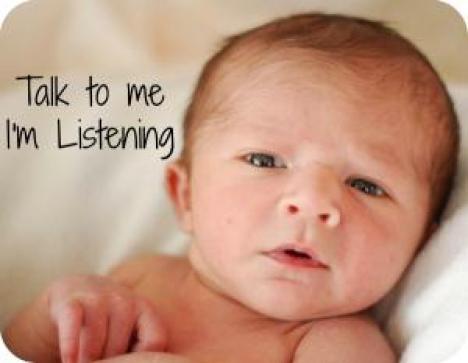Often referred to as ‘baby talk’, Motherese (or Parentese or Fatherese) is a term used to describe the quality of speech caregivers often use when speaking to a newborn child. Using a higher pitch, more exaggerated articulation, and great facial expressions, we seem to naturally talk in this manner to babies.
Many have debated the importance or hindrance that use of baby talk has on a child’s speech and language development. Some parents believe that baby talk is an important first step in teaching a child to talk and some believe that using baby talk limits a child’s language comprehension. Researchers have conducted studies to find an answer. While modeling adult language is beneficial to a child’s speech and language development, baby talk has withstood the test of time and been a useful tool in creating a bond between an infant and their parent. This attachment helps a child learn to develop relationships with others throughout life. Babies from many different cultures around the world, speaking many different languages have shown interest in this quality of speech as it grabs their attention. This type of interaction can also give an infant their first experience with social cues such as turn taking and eye contact, and speech sounds.
Within the first days of life, a baby’s brain has remarkable neuroplasticity, meaning they can create new neural connections quickly and absorb new information like a sponge. As they experience their first sights, smells, and sounds, they make many first impressions that are everlasting. Studies have shown that babies often learn to recognize and prefer the sound of their caretaker’s voice. Although researchers have not been able to identify whether it’s more beneficial to use adult speech right from the start, use of brain scanning technology has allowed us to see the reactions infants have to adults using baby talk in their native language as well as foreign languages. This TED talk by Patricia Kuhl discusses one of these studies.
Remember- there is no clearly defined right or wrong style of parenting or teaching. If you are a new parent, no matter how you choose to speak to your child, just make sure you do it! Even when you are not speaking directly to an infant, they’re constantly taking in information and making connections. Whether by choice or instinct, if you do use motherese with your child, it is recommended that this type of speech be weaned off as the child reaches toddlerhood and begins develop speech and language skills.
More resources to check out:
ASHA: How Babies Form Foundations for Language
TED: The Surprisingly Logical Minds of Babies
Photo credit: www.prettymomguide.com

